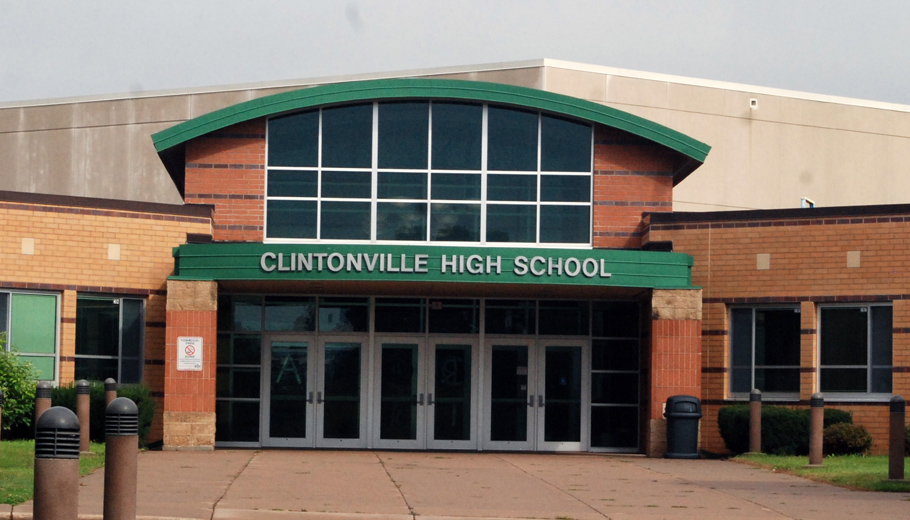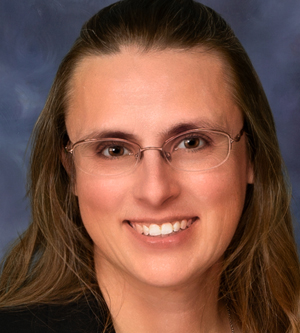
Four candidates running for two seats
By Bert Lehman
Four candidates will face off for three seats on the Clintonville School Board in the spring election on April 2.
Board members up for reelection are Ben Huber and Kris Strauman.
Chad Dobbe is not running for another term on the school board.
Klint Barkow and Marie Vandenberg are also running.
The three candidates who receive the most votes will be elected to three-year terms. The Clintonville Tribune-Gazette sent questions to the four candidates to get their views on issues important to the district.
Why do you want to be a member of the Clintonville School Board?

Barkow: I want to be a member of the school board to be able to contribute to the community and help our teachers and students achieve their best in educational excellence. My mother was a school teacher as well as several of my friends and relatives so I did, and still do, listen to many of the issues our teachers and students have to face.
There are many challenges in today’s society with teaching and working with our children. These issues are in constant change. I will bring a positive and fresh outlook to help the board solve the problems we face today and in the future.
Huber: I believe that the education of our children is one of the most important things that a community can do. I want to continue to be a strong voice for our children’s education.
Strauman: I would like to remain a board member as I see this board as an involved group of members who are passionate about our district. Current members are not rubber stamps and are not afraid to speak up. Good, solid decisions have been made for the betterment of our community. We have some tough issues to address and would like to continue working collectively as a board.
Vandenberg: I believe issues and concerns need to be addressed so issues can improve. I want to encourage families to bring their concerns to me so we can address them because nothing bad ever comes from an open conversation. I am approachable, a good listener, and easy to talk to. I am a parent, a business owner, and an aunt with kids in the district. I have a vested interest in seeing our students and school district improve and thrive.
What are your qualifications to serve on the Clintonville School Board?
Barkow: I have lived in Clintonville my entire life. I was born in 1976 and raised on a farm just outside of Embarrass. My dad was a welder at H&S and raised beef cattle. My mom raised 4 kids; myself, my older brother, and 2 younger sisters. My mother worked extremely hard at raising her children as well as serving as a substitute teacher at area schools. I went to K-8 at St. Martin and 9-12 at the CPSD. I got married a few years after high school and built a house on Laude Road where I still live with my wife, Heather, and my three children. My two sons are graduates of Clintonville High School and my daughter is a sophomore there as well. I started working as a sheet metal worker in 1998 for August Winter & Son’s before becoming a project manager there and am now one of the owners. I coached Clintonville Youth League baseball for several years with my boys and now serve as an usher and elder at St. Martin Lutheran Church. I also love to hunt, fish, and travel with my wife.

Huber: Much of my life I was a dairy farmer. This shaped my decision-making processes. I understand how budgets work, that difficult decisions must be made, and that a healthy future depends on how well you raise the next generation.
I believe my experience on the board, and my extensive knowledge of the education systems that I have gained through that experience, gives me the ability to take the district in the direction it needs to go.
Strauman: I have 43 years of experience in education. I have been a teacher and a building principal working with students and their parents in PreK-12 grades. From 1997 until 2014, I served the Clintonville community as Elementary Principal. After my retirement in 2014, I continued to serve the district as a substitute teacher until elected to the school board in 2017.
Vandenberg: I am a parent of school-age children, a small business owner, and a board member for Onward Clintonville. I have an accounting degree and excel with tight budgets. I can see both the big picture and the small picture on issues, and am a team player in resolving issues for the larger goal.
What do you feel is the biggest issue facing the Clintonville School District, and how would you try to fix that issue?
Barkow: I truly believe the answer to this question lies in the conversations that I would enjoy having with the staff at CPSD. This is the exact question I will also ask the existing board at the first meeting if I am elected. I know the budget is an issue. I know teacher turnover is an issue. I know curriculum and grading issues are common discussions that I hear, and they are all important and all issues that need to be addressed.
In my opinion, my best avenue at understanding the issues of the status of our school is to get in the school and ask those who are most directly in the know.
Huber: One of the biggest issues facing our district is to continue to promote the positives that our district provides. Our students have many great opportunities. We are large enough to give students a path toward work or tech, through our school to work programs and ties to FVTC, to give our college bound students a great head-start with university credits, to give everyone a long list of extra-curricular activities to be involved in. We are also small enough that everyone can participate in almost anything they wish.

Strauman: Like many rural school districts, Clintonville is faced with declining enrollment. When enrollment declines, so does funding. We will need to address ways to spend less while continuing as many of our experiences and programs for our students and community. It is a complex issue that will need input from many sources.
Vandenberg: I believe the biggest issue is communication and transparency. Residents in the Clintonville School District have the right to know what is happening. I want families to feel comfortable raising their concerns and discussing issues. Topics should not get pushed aside to be dealt with later. I started “coffee with a candidate” and “meet your candidates.” I plan to continue those types of events if I am elected, as it is important to have residents know the people who are representing them.
In the district’s most recent financial audit, it was once again noted that the district is not following its policy that its fund balance should be 25% of the total expenditures in the general fund. The district is currently at around 13%. Do you feel it is important for the district to follow the policies the school board sets for the district? Why or why not?
Barkow: If a policy is set it should be followed. The 25% rule is a good rule that households should use for budgeting so you have a nest egg in case something bad happens. I would like to see the fund balance get back to what the policy states unless a feasibility study can prove otherwise. For me, the answer to this question lies in more research and listening to details.
Huber: The district fund balance policy is a good recommendation. During that audit process, it was stated that 80% of school districts across the state have needed to go to an operating referendum to continue to stay open. We have not needed to do that. Our funding is limited to what the state determines. While I would prefer to have a 25% balance, until the state helps out rural districts, we will have to make do with what we have.
Strauman: It is imperative that district policies should be followed. In order to keep our district operating smoothly, the school board must set the policies and procedures so the personnel teams operate as they are meant to. Policies provide personnel with an understanding of expected performance and behaviors. Policies provide the rules for the decision-making process. If any mistakes are made, the policies can be quickly addressed. Without policies in place, the district is exposed to risk.
Vandenberg: Yes, it is imperative to follow policies, especially relating to finances. Policies are written to protect the district, although it is also important to review policies from time to time to make sure they are still relevant. It is also important to take into consideration extenuating circumstances. Adequate and justifiable data must be communicated for not following the policies.
What steps should the district take to get its fund balance back up to the policy level of 25% of the total expenditures in the general fund?
Barkow: I believe in smart goals. We need to make sure they are measurable and attainable. Set a date with your goals and make it happen. If you don’t set a date with a goal it won’t happen. Tough decisions will have to be made, but we can and will get there if the 25% rule is a policy we want to maintain.
Huber: We must continue to look at all expenditures and see if there are places where we can save. The completion of the sale of the elementary complex will give a nice bump to the fund balance percentage as well.
Strauman: For several years, our district operated with a healthy fund balance of 25%. As our enrollment continued to drop over the years, our fund balance was dwindling. There are a few things we can do to increase our fund balance. The first step would be to take a close look at district expenditures. There are some budgeted items that are absolutely necessary for safe operation, but other items can be looked closely at. With approximately 80% of our total budget being personnel, we have to carefully assess programs and look at scheduling so we can continue to maintain our “top notch” offerings.
Vandenberg: I would review the recommendations that were presented at the time the proposal to drop was made, and which steps have already been taken to correct this. It would be imperative to work with the school board members to explore other avenues to expedite returning to 25%.
The most recent school budget passed by the school board included a deficit of around $1 million, and deficits are projected for future years. How can the district get to a balanced budget?
Barkow: This answer is similar to my last response. Tough decisions will need to be made. Something needs to give. You can’t spend what you don’t have and I will not spend money that our community doesn’t have. We will have to make cuts, but not at the expense of our students’ education. As in all businesses, there is room to narrow down, but I will keep the interest of our students’ education at root.
Huber: There have already been real savings to reduce that deficit. The year end number will look considerably better than the original budget. Looking forward, we will need to continue to realize the lowered costs of our new and newly refurbished buildings and grounds. There will be significantly less spending needed on those items, such as roofs and parking lots etc.
Strauman: To get the district to a balanced budget, we need to review the financial records, then compare the actual budget amounts from the previous year to this year. A financial forecast is then created. Expenses are identified and revenue estimated. Once you subtract the expenses from the revenue, you get a picture of the projected budget. Our administration has worked closely with financial advisors to get budget projections. The difficulty with balancing a school district budget, is the uncertainty of the state funding and our enrollment numbers. Many districts in recent years have had to resort to operational referendums.

Vandenberg: The district has recently made changes to improve the process for tracking expenses, thus creating a clearer picture of where expenses are being incurred, and offering opportunities to make the necessary adjustments and improvements. This is a crucial step in correcting the deficit, and must continue to be analyzed on an ongoing basis until a balanced budget is reached.
Do you feel the Clintonville School District is on the right path to success? Explain why or why not.
Barkow: I do. My sons recently graduated from CHS. My oldest son, Klay, went to NWTC and is now working at August Winter as a service technician and my son, Kolton, is a freshman at Platteville studying to be an engineer. My daughter, Madi, is a sophomore now and I am looking forward to seeing what her future may hold. I can attest that my children have had a good education attending CHS. Having the ability to take college credit classes in high school is a huge time and cost saving advantage that CHS offers and should continue to do so, and even expand on. I acknowledge and appreciate all of the educators that have shaped the learning environment of my children.
Huber: The state of the Clintonville School District is strong. We have a new consolidated campus. We have a wonderful professional staff that truly cares about our children’s future. We also have a community that cares about our children, and knows the value that a good education will bring.
Strauman: The Clintonville District is on the right path to success. We have innovative offerings for our students who not only are college-bound, but for those students entering the work force. We have extraordinary facilities. Our administrators, teachers, and support personnel are dedicated to our district and you will be hard pressed to find any better. We have a community recreation center that is recognized as exceptional. Our day care is remarkable. In listening to our superintendent’s report at monthly board meetings, other districts contact him to see what Clintonville is doing and how they can model their programs after ours.
Vandenberg: Yes, I believe the Clintonville School District is on the right path. They have a strong group of leaders and top educators offering prime education to the students. The students have ample opportunities to learn at all grades and levels, as well as offerings in a large array of extracurricular programs. There are state-of-the-art classrooms in new and remodeled buildings, creating a safe environment. The students’ education and well-being is first and foremost in Clintonville.
Why should residents in the Clintonville School District vote for you?
Barkow: If you’re looking for someone on the board that will vote for balanced budgets, what’s best for our students, and common-sense hometown beliefs, then I deserve your vote. Another thing to consider is that I will not keep any payments for being on the school board. While on the board, I will give back any payments paid to me to the sports programs at CHS.
Huber: I have tried to bring a level headed approach to all aspects that the board has jurisdiction over. I have helped lead the district through the referendum process for the new buildings. I will continue to do all that is in my power to help provide the best education possible for our students and community.
Strauman: I have extensive experience in education and have served the Clintonville District and community for the past 27 years. I am a good listener and I feel decisions should be made with input from those who are involved and those the decision could affect. It’s important that we maintain programs for our students as well as those for our community.
Vandenberg: I am passionate about the Clintonville School District, and I want the district and its students to excel. We are a small town and we should be proud of it. We should be using our small-town strengths to our advantage. I will consider what is best for everyone, and help the Clintonville School Board create a strong and flourishing school district.
